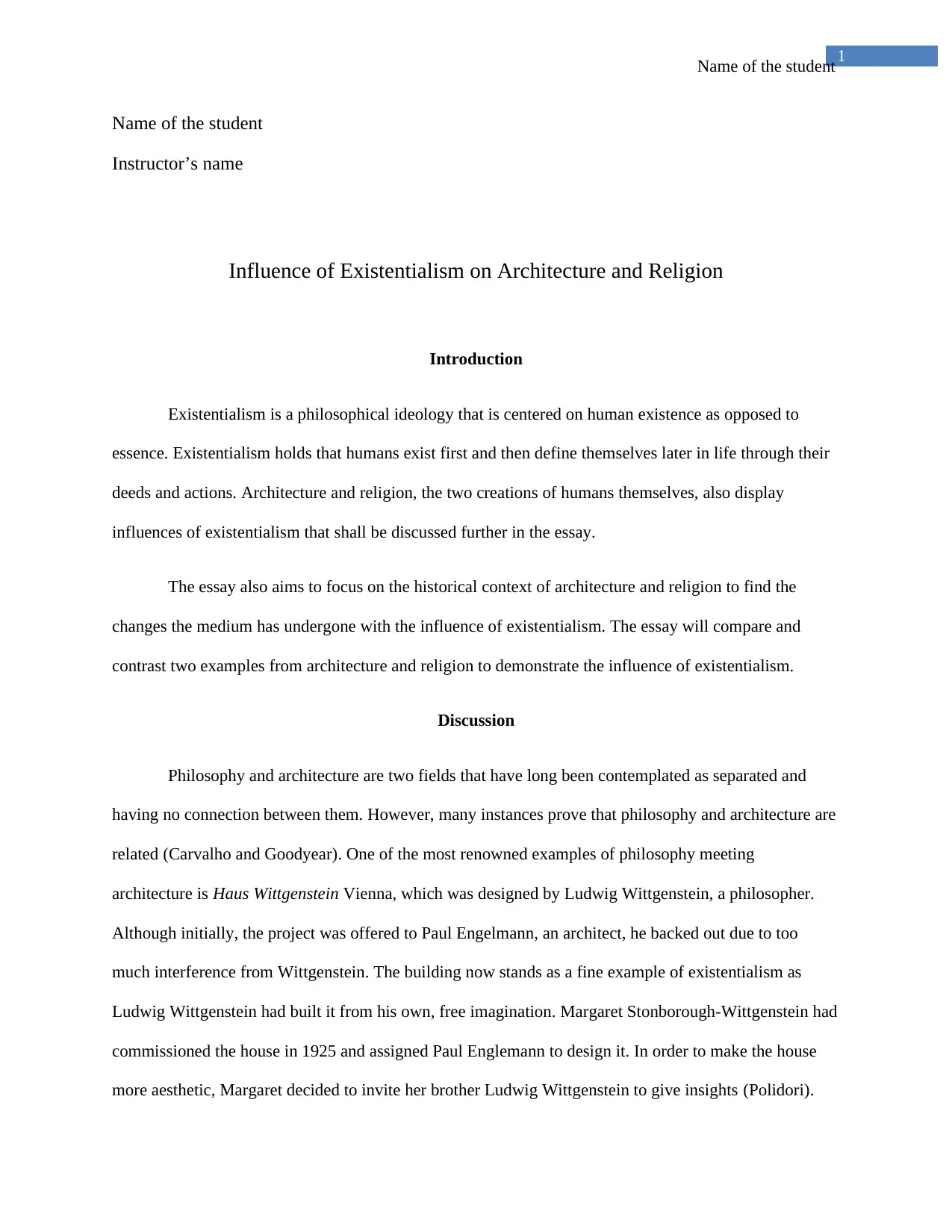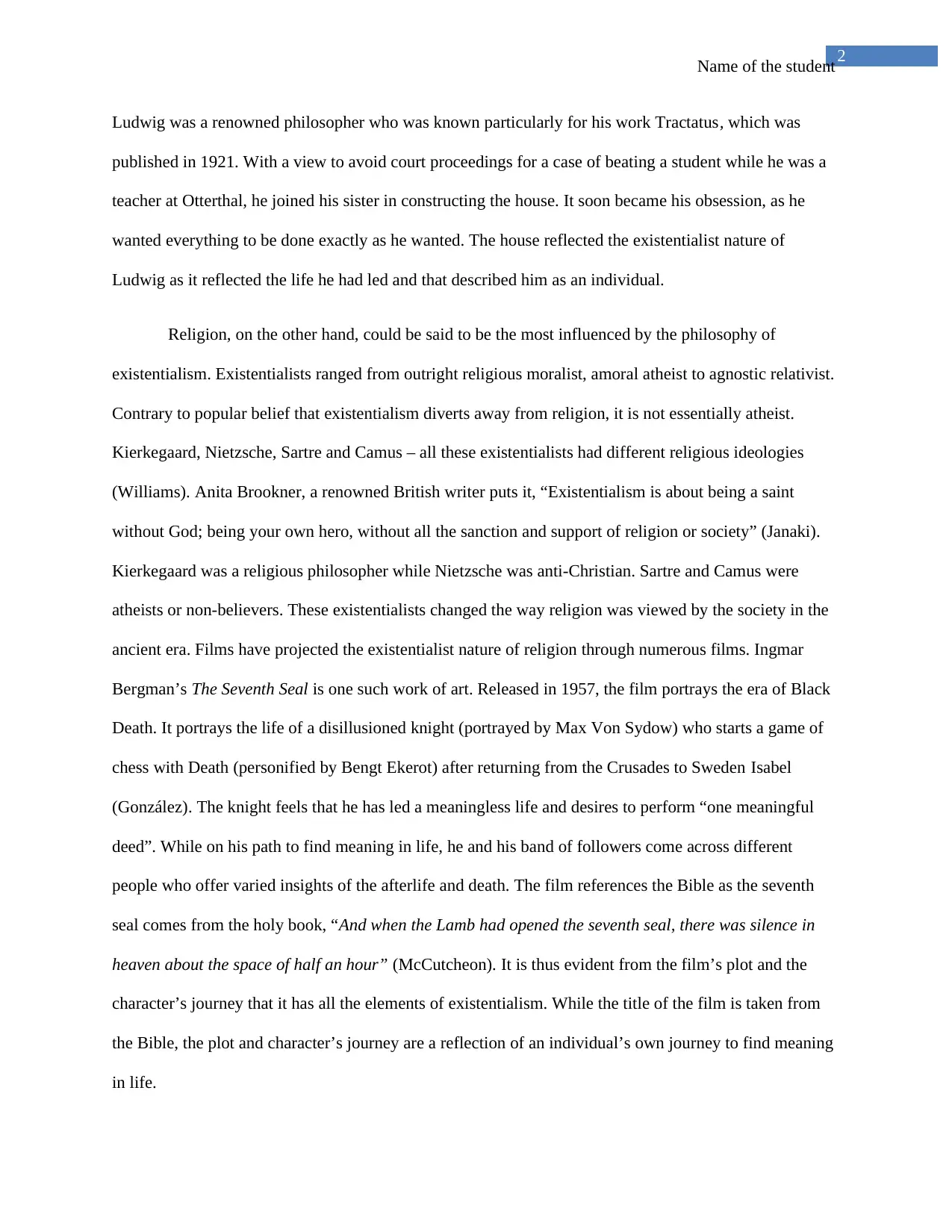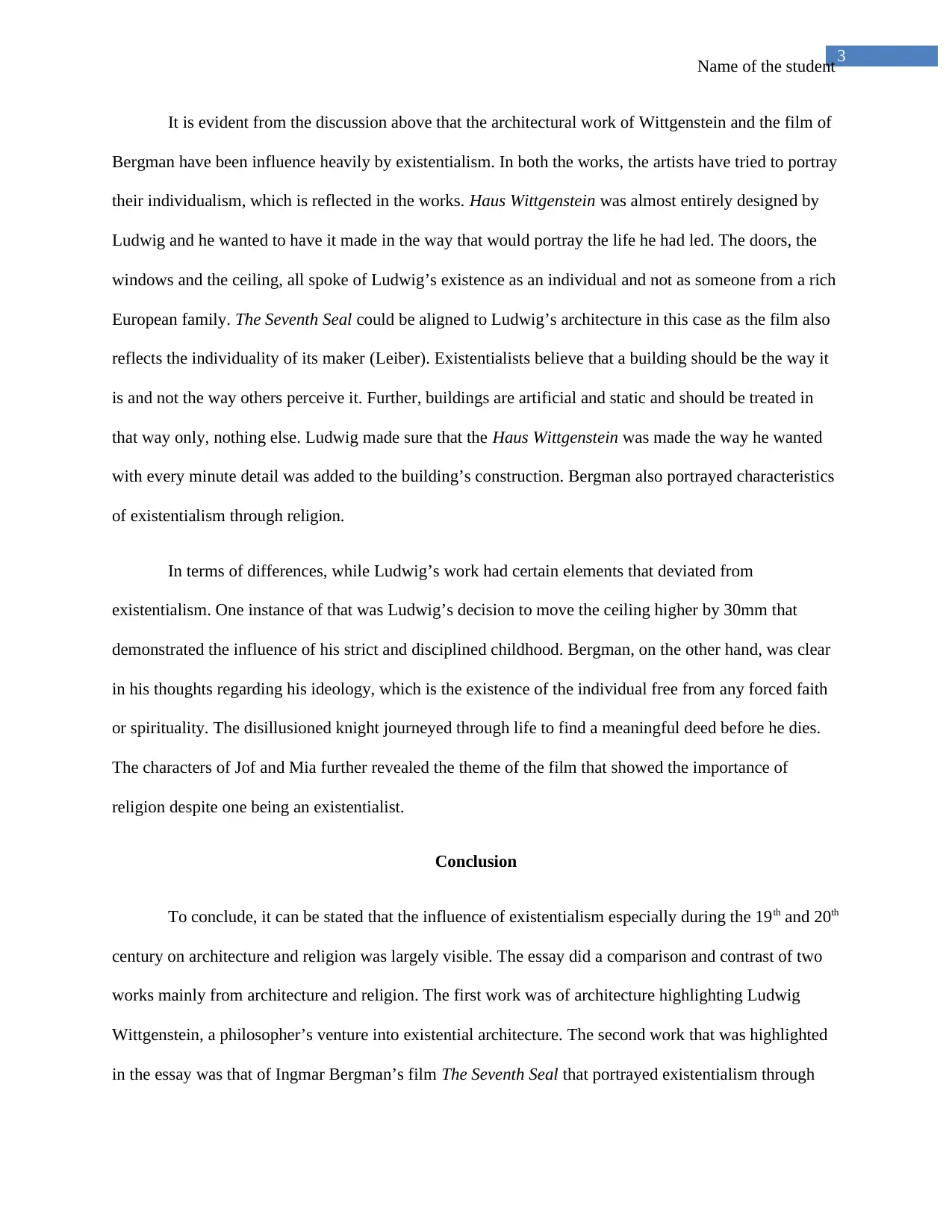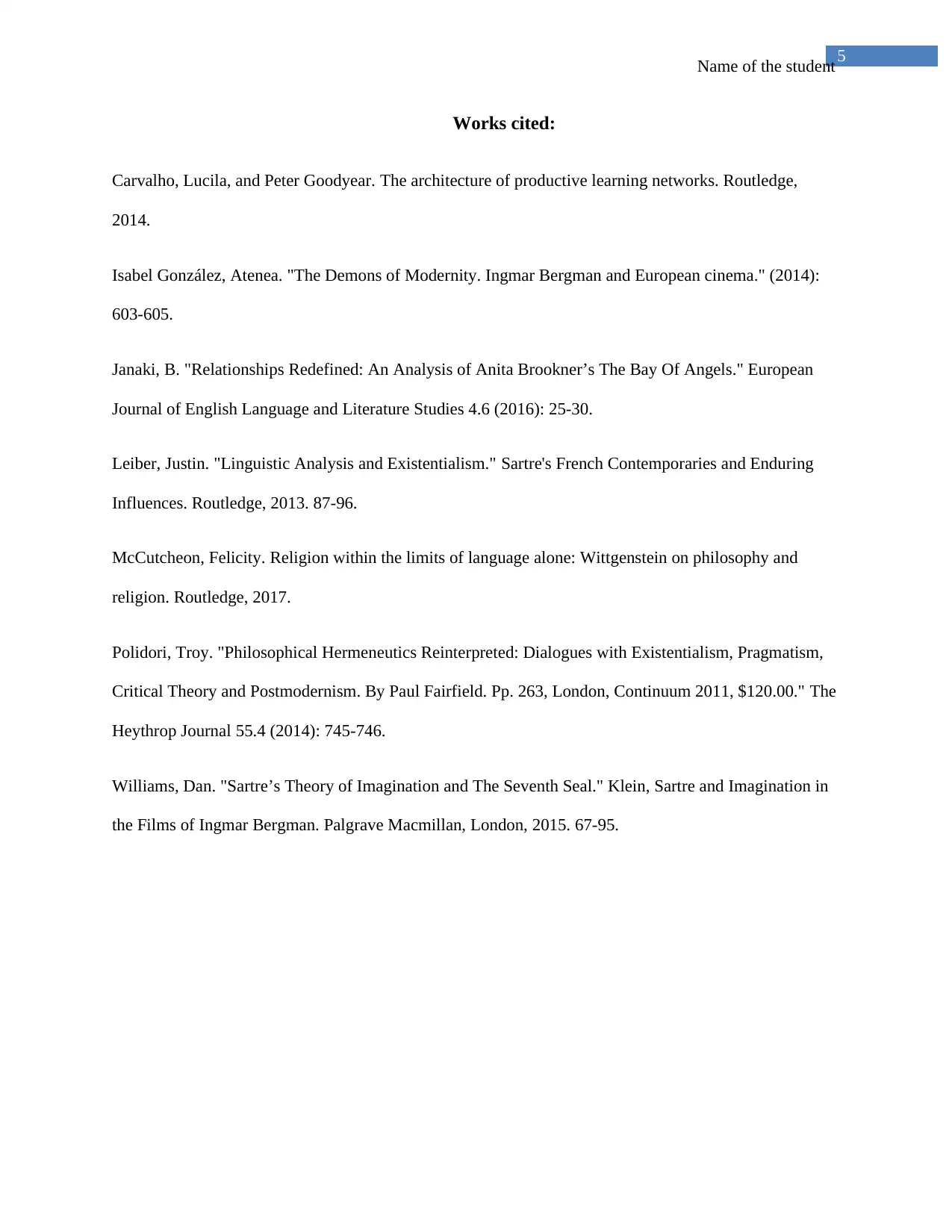The Influence of Existentialism on Architecture and Religion
VerifiedAdded on 2023/05/30
|5
|1417
|284
Essay
AI Summary
This essay explores the influence of existentialism on architecture and religion, focusing on the philosophical ideology that centers on human existence. It discusses how existentialism, which posits that humans define themselves through actions, has impacted these two human creations. The essay compares and contrasts Ludwig Wittgenstein's Haus Wittgenstein as an example of existentialism in architecture, reflecting Wittgenstein's individualism, with Ingmar Bergman's film 'The Seventh Seal,' which portrays existential themes through religious allegory. The analysis reveals how both works reflect the artists' individualistic expressions, with Wittgenstein's building embodying his life and Bergman's film exploring the search for meaning. The essay concludes that existentialism significantly influenced both architecture and religion, emphasizing individual existence and the quest for essence in life.

1
Name of the student
Name of the student
Instructor’s name
Influence of Existentialism on Architecture and Religion
Introduction
Existentialism is a philosophical ideology that is centered on human existence as opposed to
essence. Existentialism holds that humans exist first and then define themselves later in life through their
deeds and actions. Architecture and religion, the two creations of humans themselves, also display
influences of existentialism that shall be discussed further in the essay.
The essay also aims to focus on the historical context of architecture and religion to find the
changes the medium has undergone with the influence of existentialism. The essay will compare and
contrast two examples from architecture and religion to demonstrate the influence of existentialism.
Discussion
Philosophy and architecture are two fields that have long been contemplated as separated and
having no connection between them. However, many instances prove that philosophy and architecture are
related (Carvalho and Goodyear). One of the most renowned examples of philosophy meeting
architecture is Haus Wittgenstein Vienna, which was designed by Ludwig Wittgenstein, a philosopher.
Although initially, the project was offered to Paul Engelmann, an architect, he backed out due to too
much interference from Wittgenstein. The building now stands as a fine example of existentialism as
Ludwig Wittgenstein had built it from his own, free imagination. Margaret Stonborough-Wittgenstein had
commissioned the house in 1925 and assigned Paul Englemann to design it. In order to make the house
more aesthetic, Margaret decided to invite her brother Ludwig Wittgenstein to give insights (Polidori).
Name of the student
Name of the student
Instructor’s name
Influence of Existentialism on Architecture and Religion
Introduction
Existentialism is a philosophical ideology that is centered on human existence as opposed to
essence. Existentialism holds that humans exist first and then define themselves later in life through their
deeds and actions. Architecture and religion, the two creations of humans themselves, also display
influences of existentialism that shall be discussed further in the essay.
The essay also aims to focus on the historical context of architecture and religion to find the
changes the medium has undergone with the influence of existentialism. The essay will compare and
contrast two examples from architecture and religion to demonstrate the influence of existentialism.
Discussion
Philosophy and architecture are two fields that have long been contemplated as separated and
having no connection between them. However, many instances prove that philosophy and architecture are
related (Carvalho and Goodyear). One of the most renowned examples of philosophy meeting
architecture is Haus Wittgenstein Vienna, which was designed by Ludwig Wittgenstein, a philosopher.
Although initially, the project was offered to Paul Engelmann, an architect, he backed out due to too
much interference from Wittgenstein. The building now stands as a fine example of existentialism as
Ludwig Wittgenstein had built it from his own, free imagination. Margaret Stonborough-Wittgenstein had
commissioned the house in 1925 and assigned Paul Englemann to design it. In order to make the house
more aesthetic, Margaret decided to invite her brother Ludwig Wittgenstein to give insights (Polidori).
Paraphrase This Document
Need a fresh take? Get an instant paraphrase of this document with our AI Paraphraser

2
Name of the student
Ludwig was a renowned philosopher who was known particularly for his work Tractatus, which was
published in 1921. With a view to avoid court proceedings for a case of beating a student while he was a
teacher at Otterthal, he joined his sister in constructing the house. It soon became his obsession, as he
wanted everything to be done exactly as he wanted. The house reflected the existentialist nature of
Ludwig as it reflected the life he had led and that described him as an individual.
Religion, on the other hand, could be said to be the most influenced by the philosophy of
existentialism. Existentialists ranged from outright religious moralist, amoral atheist to agnostic relativist.
Contrary to popular belief that existentialism diverts away from religion, it is not essentially atheist.
Kierkegaard, Nietzsche, Sartre and Camus – all these existentialists had different religious ideologies
(Williams). Anita Brookner, a renowned British writer puts it, “Existentialism is about being a saint
without God; being your own hero, without all the sanction and support of religion or society” (Janaki).
Kierkegaard was a religious philosopher while Nietzsche was anti-Christian. Sartre and Camus were
atheists or non-believers. These existentialists changed the way religion was viewed by the society in the
ancient era. Films have projected the existentialist nature of religion through numerous films. Ingmar
Bergman’s The Seventh Seal is one such work of art. Released in 1957, the film portrays the era of Black
Death. It portrays the life of a disillusioned knight (portrayed by Max Von Sydow) who starts a game of
chess with Death (personified by Bengt Ekerot) after returning from the Crusades to Sweden Isabel
(González). The knight feels that he has led a meaningless life and desires to perform “one meaningful
deed”. While on his path to find meaning in life, he and his band of followers come across different
people who offer varied insights of the afterlife and death. The film references the Bible as the seventh
seal comes from the holy book, “And when the Lamb had opened the seventh seal, there was silence in
heaven about the space of half an hour” (McCutcheon). It is thus evident from the film’s plot and the
character’s journey that it has all the elements of existentialism. While the title of the film is taken from
the Bible, the plot and character’s journey are a reflection of an individual’s own journey to find meaning
in life.
Name of the student
Ludwig was a renowned philosopher who was known particularly for his work Tractatus, which was
published in 1921. With a view to avoid court proceedings for a case of beating a student while he was a
teacher at Otterthal, he joined his sister in constructing the house. It soon became his obsession, as he
wanted everything to be done exactly as he wanted. The house reflected the existentialist nature of
Ludwig as it reflected the life he had led and that described him as an individual.
Religion, on the other hand, could be said to be the most influenced by the philosophy of
existentialism. Existentialists ranged from outright religious moralist, amoral atheist to agnostic relativist.
Contrary to popular belief that existentialism diverts away from religion, it is not essentially atheist.
Kierkegaard, Nietzsche, Sartre and Camus – all these existentialists had different religious ideologies
(Williams). Anita Brookner, a renowned British writer puts it, “Existentialism is about being a saint
without God; being your own hero, without all the sanction and support of religion or society” (Janaki).
Kierkegaard was a religious philosopher while Nietzsche was anti-Christian. Sartre and Camus were
atheists or non-believers. These existentialists changed the way religion was viewed by the society in the
ancient era. Films have projected the existentialist nature of religion through numerous films. Ingmar
Bergman’s The Seventh Seal is one such work of art. Released in 1957, the film portrays the era of Black
Death. It portrays the life of a disillusioned knight (portrayed by Max Von Sydow) who starts a game of
chess with Death (personified by Bengt Ekerot) after returning from the Crusades to Sweden Isabel
(González). The knight feels that he has led a meaningless life and desires to perform “one meaningful
deed”. While on his path to find meaning in life, he and his band of followers come across different
people who offer varied insights of the afterlife and death. The film references the Bible as the seventh
seal comes from the holy book, “And when the Lamb had opened the seventh seal, there was silence in
heaven about the space of half an hour” (McCutcheon). It is thus evident from the film’s plot and the
character’s journey that it has all the elements of existentialism. While the title of the film is taken from
the Bible, the plot and character’s journey are a reflection of an individual’s own journey to find meaning
in life.

3
Name of the student
It is evident from the discussion above that the architectural work of Wittgenstein and the film of
Bergman have been influence heavily by existentialism. In both the works, the artists have tried to portray
their individualism, which is reflected in the works. Haus Wittgenstein was almost entirely designed by
Ludwig and he wanted to have it made in the way that would portray the life he had led. The doors, the
windows and the ceiling, all spoke of Ludwig’s existence as an individual and not as someone from a rich
European family. The Seventh Seal could be aligned to Ludwig’s architecture in this case as the film also
reflects the individuality of its maker (Leiber). Existentialists believe that a building should be the way it
is and not the way others perceive it. Further, buildings are artificial and static and should be treated in
that way only, nothing else. Ludwig made sure that the Haus Wittgenstein was made the way he wanted
with every minute detail was added to the building’s construction. Bergman also portrayed characteristics
of existentialism through religion.
In terms of differences, while Ludwig’s work had certain elements that deviated from
existentialism. One instance of that was Ludwig’s decision to move the ceiling higher by 30mm that
demonstrated the influence of his strict and disciplined childhood. Bergman, on the other hand, was clear
in his thoughts regarding his ideology, which is the existence of the individual free from any forced faith
or spirituality. The disillusioned knight journeyed through life to find a meaningful deed before he dies.
The characters of Jof and Mia further revealed the theme of the film that showed the importance of
religion despite one being an existentialist.
Conclusion
To conclude, it can be stated that the influence of existentialism especially during the 19th and 20th
century on architecture and religion was largely visible. The essay did a comparison and contrast of two
works mainly from architecture and religion. The first work was of architecture highlighting Ludwig
Wittgenstein, a philosopher’s venture into existential architecture. The second work that was highlighted
in the essay was that of Ingmar Bergman’s film The Seventh Seal that portrayed existentialism through
Name of the student
It is evident from the discussion above that the architectural work of Wittgenstein and the film of
Bergman have been influence heavily by existentialism. In both the works, the artists have tried to portray
their individualism, which is reflected in the works. Haus Wittgenstein was almost entirely designed by
Ludwig and he wanted to have it made in the way that would portray the life he had led. The doors, the
windows and the ceiling, all spoke of Ludwig’s existence as an individual and not as someone from a rich
European family. The Seventh Seal could be aligned to Ludwig’s architecture in this case as the film also
reflects the individuality of its maker (Leiber). Existentialists believe that a building should be the way it
is and not the way others perceive it. Further, buildings are artificial and static and should be treated in
that way only, nothing else. Ludwig made sure that the Haus Wittgenstein was made the way he wanted
with every minute detail was added to the building’s construction. Bergman also portrayed characteristics
of existentialism through religion.
In terms of differences, while Ludwig’s work had certain elements that deviated from
existentialism. One instance of that was Ludwig’s decision to move the ceiling higher by 30mm that
demonstrated the influence of his strict and disciplined childhood. Bergman, on the other hand, was clear
in his thoughts regarding his ideology, which is the existence of the individual free from any forced faith
or spirituality. The disillusioned knight journeyed through life to find a meaningful deed before he dies.
The characters of Jof and Mia further revealed the theme of the film that showed the importance of
religion despite one being an existentialist.
Conclusion
To conclude, it can be stated that the influence of existentialism especially during the 19th and 20th
century on architecture and religion was largely visible. The essay did a comparison and contrast of two
works mainly from architecture and religion. The first work was of architecture highlighting Ludwig
Wittgenstein, a philosopher’s venture into existential architecture. The second work that was highlighted
in the essay was that of Ingmar Bergman’s film The Seventh Seal that portrayed existentialism through
⊘ This is a preview!⊘
Do you want full access?
Subscribe today to unlock all pages.

Trusted by 1+ million students worldwide

4
Name of the student
religion. It was found that both architecture and religion were influenced by existentialism that states that
individuals exist first and then find essence in life.
Name of the student
religion. It was found that both architecture and religion were influenced by existentialism that states that
individuals exist first and then find essence in life.
Paraphrase This Document
Need a fresh take? Get an instant paraphrase of this document with our AI Paraphraser

5
Name of the student
Works cited:
Carvalho, Lucila, and Peter Goodyear. The architecture of productive learning networks. Routledge,
2014.
Isabel González, Atenea. "The Demons of Modernity. Ingmar Bergman and European cinema." (2014):
603-605.
Janaki, B. "Relationships Redefined: An Analysis of Anita Brookner’s The Bay Of Angels." European
Journal of English Language and Literature Studies 4.6 (2016): 25-30.
Leiber, Justin. "Linguistic Analysis and Existentialism." Sartre's French Contemporaries and Enduring
Influences. Routledge, 2013. 87-96.
McCutcheon, Felicity. Religion within the limits of language alone: Wittgenstein on philosophy and
religion. Routledge, 2017.
Polidori, Troy. "Philosophical Hermeneutics Reinterpreted: Dialogues with Existentialism, Pragmatism,
Critical Theory and Postmodernism. By Paul Fairfield. Pp. 263, London, Continuum 2011, $120.00." The
Heythrop Journal 55.4 (2014): 745-746.
Williams, Dan. "Sartre’s Theory of Imagination and The Seventh Seal." Klein, Sartre and Imagination in
the Films of Ingmar Bergman. Palgrave Macmillan, London, 2015. 67-95.
Name of the student
Works cited:
Carvalho, Lucila, and Peter Goodyear. The architecture of productive learning networks. Routledge,
2014.
Isabel González, Atenea. "The Demons of Modernity. Ingmar Bergman and European cinema." (2014):
603-605.
Janaki, B. "Relationships Redefined: An Analysis of Anita Brookner’s The Bay Of Angels." European
Journal of English Language and Literature Studies 4.6 (2016): 25-30.
Leiber, Justin. "Linguistic Analysis and Existentialism." Sartre's French Contemporaries and Enduring
Influences. Routledge, 2013. 87-96.
McCutcheon, Felicity. Religion within the limits of language alone: Wittgenstein on philosophy and
religion. Routledge, 2017.
Polidori, Troy. "Philosophical Hermeneutics Reinterpreted: Dialogues with Existentialism, Pragmatism,
Critical Theory and Postmodernism. By Paul Fairfield. Pp. 263, London, Continuum 2011, $120.00." The
Heythrop Journal 55.4 (2014): 745-746.
Williams, Dan. "Sartre’s Theory of Imagination and The Seventh Seal." Klein, Sartre and Imagination in
the Films of Ingmar Bergman. Palgrave Macmillan, London, 2015. 67-95.
1 out of 5
Your All-in-One AI-Powered Toolkit for Academic Success.
+13062052269
info@desklib.com
Available 24*7 on WhatsApp / Email
![[object Object]](/_next/static/media/star-bottom.7253800d.svg)
Unlock your academic potential
Copyright © 2020–2026 A2Z Services. All Rights Reserved. Developed and managed by ZUCOL.